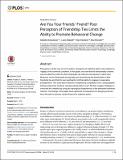| dc.contributor.author | Almaatouq, Abdullah | |
| dc.contributor.author | Radaelli, Laura | |
| dc.contributor.author | Pentland, Alex | |
| dc.contributor.author | Shmueli, Erez | |
| dc.date.accessioned | 2021-04-01T14:06:00Z | |
| dc.date.available | 2021-04-01T14:06:00Z | |
| dc.date.issued | 2016-03-22 | |
| dc.identifier.uri | https://hdl.handle.net/1721.1/130325 | |
| dc.description.abstract | Persuasion is at the core of norm creation, emergence of collective action, and solutions to ‘tragedy of the commons’ problems. In this paper, we show that the directionality of friendship ties affect the extent to which individuals can influence the behavior of each other. Moreover, we find that people are typically poor at perceiving the directionality of their friendship ties and that this can significantly limit their ability to engage in cooperative arrangements. This could lead to failures in establishing compatible norms, acting together, finding compromise solutions, and persuading others to act. We then suggest strategies to overcome this limitation by using two topological characteristics of the perceived friendship network. The findings of this paper have significant consequences for designing interventions that seek to harness social influence for collective action. | en_US |
| dc.language.iso | en | en_US |
| dc.publisher | PLOS ONE | en_US |
| dc.rights | Attribution-NonCommercial-ShareAlike 3.0 United States | * |
| dc.rights.uri | http://creativecommons.org/licenses/by-nc-sa/3.0/us/ | * |
| dc.title | Are You Your Friends’ Friend? Poor Perception of Friendship Ties Limits the Ability to Promote Behavioral Change | en_US |
| dc.type | Article | en_US |
| dc.identifier.citation | Almaatouq, A., Radaelli, L., Pentland, A., & Shmueli, E. (2016). Are you your friends’ friend? Poor perception of friendship ties limits the ability to promote behavioral change. PloS one, 11(3), e0151588. | en_US |
